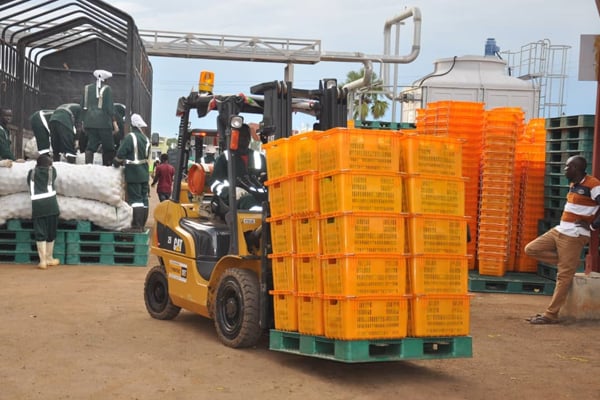Prime
Govt to privatise Soroti Fruit Factory

President Museveni commissions Soroti Fruit Factory on April 13, 2019. PHOTO/FILE
What you need to know:
- The factory is said to be making losses, despite government investment through annual budget allocations.
- Mr Ongalo said an Ethiopian-based investor has been approached as the potential person to whom the plant can be privatised.
- He further said in a few days, they will be meeting her because she has a vast experience in the same business.
The government has started sourcing for a private entity that will take over the operations of Soroti fruit factory, which produces Teso juice (Teju) products.
The State Minister for Teso Affairs, Mr Kenneth Obote Ongalo, while meeting the Teso Sub-region district chairpersons yesterday at the Teso Affairs offices in Soroti, said the decision to have the entity privatised was reached at after a frustrating spell.
This has seen the factory fail to make profits despite continued investment by government through Uganda Development Corporation (UDC).
Soroti fruit factory is 80 percent owned by the government through UDC while the 20 percent shares are owned by the farmers through the Teso Tropical Fruit Growers Cooperative Union (TETFGCU).
Mr Ongalo said the decision to make the plant benefit the people of Teso is a presidential directive.
“The President asked the Prime Minister to engage the relevant government entities to have the fruit factory privatised, and I am part of the team that is working on the matter,” he said.
He told the LC5 chairpersons that the factory is on life support, yet every year the factory is allocated Shs5b in the budget.
Mr Ongalo said an Ethiopian-based investor has been approached for the deal. He further said in a few days, they will be meeting her because she has a vast experience in the same business.
He added that Present Museveni means good for Teso and his long-term dream of having the citrus industry turn the fortunes of Teso is still on.
He said the government chief valuer was expected to hand in the report by this week.
Mr Ongalo added that the cultivation of citrus in Teso has been an initiative that President Museveni has championed over years, which culminated into the demand for fruit factory that started in 2014.
On April 13, 2019, Mr Museveni launched commercial production of both the orange and mango juice by Soroti Fruit Factory.
“I know the pain that the presidential directive will cause because jobs will be lost but for the good of the citrus farmers in the region, this is the way to go,” the minister said.
He, however, said farmers are equally frustrated.
“The other challenge is that the plant hardly consumes 10 percent of what the farmers produce. Due to frustration, many farmers cut the trees. As we talk, the orange trees that were at eight million have since reduced,” he added.
Mr Ongalo added that even those who have not cleared their gardens are no longer maintaining their farms because the business is no longer profitable.
Mr Stephen Ochola, the Serere District chairperson, who doubles as the head of Teso LC5 chairpersons, said the much anticipated benefit from the fruit plant has not been realised, nine years later.
“We are faced with a situation where farmers are being paid Shs20,000 for a bag of oranges, yet the production costs on the farms is are very high,” he said.
Mr Francis Akorikin, the Kapelebyong District chairperson, said the farmers in Teso have lost a lot.
He added that besides the pesticides being expensive for farmers, the returns in terms of the gate prices for the fruits remain so wanting.
The Soroti fruit factory chief executive officer, Mr Julius Ekoom, said the problem the factory has faced since the time it started commercial production has been marketability of the juice and funds to buy the fruit products from farmers.
He told the LC5 chairpersons that there is no established high demand for either fresh juice or concentrates that are made by the plant, which is coupled with stiff competition from imported concentrates and ready-to-drink juices that are sold cheaply on the market.
Mr Ekoom added that the plant does not have an automated packaging line and that as a factory, they can only package about 800 boxes.
“When it comes to delivery, at one time, we only had one marketing truck for the entire country,” he said.
Mr Ekoom added that the only time the plant was able to buy two million kilogrammes of oranges from farmers was between 2019 and 2020.
Since then, he said, the purchasing of oranges from farmers has fallen drastically to below 500,000 kilogrammes for the entire Teso Sub-region. He cited limited operation capital as their major challenge.




